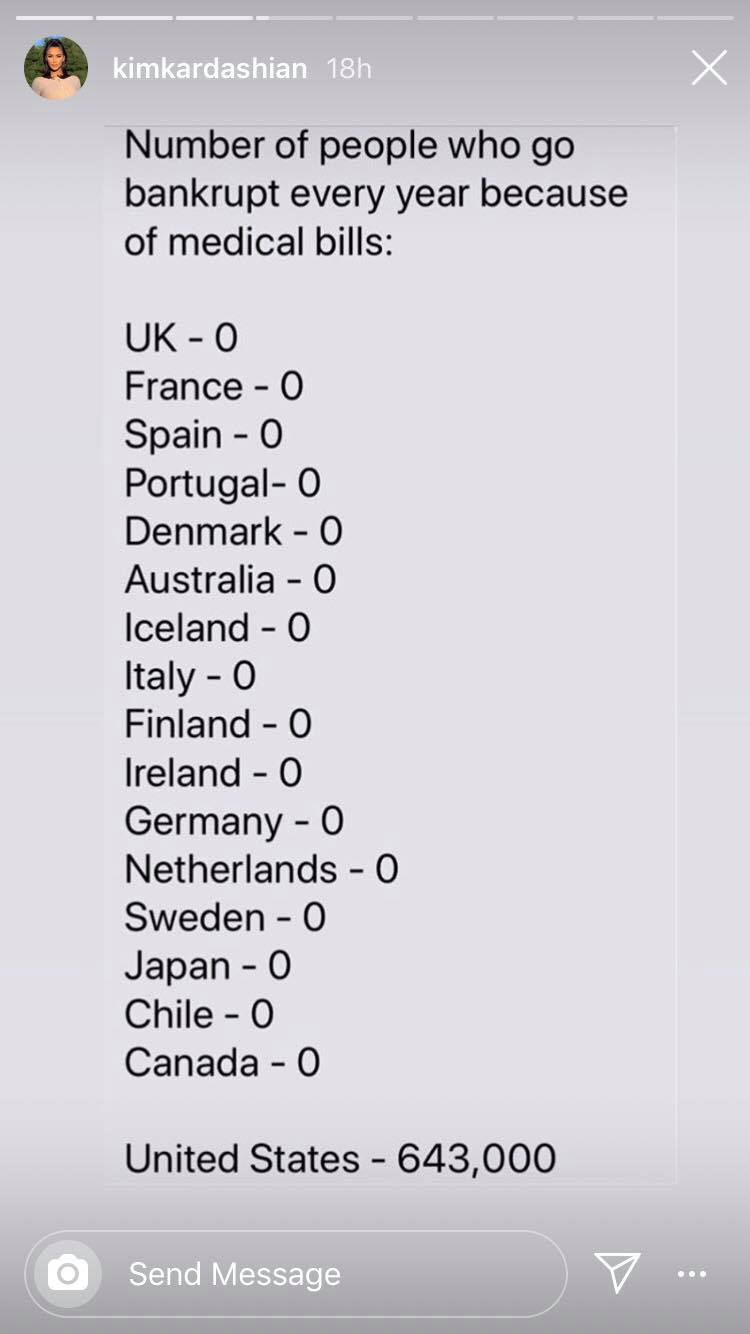The fact that 0 people in Italy went bankrupt because of healthcare bills could well be true (with caveats - see below).
In Italy healthcare is public and the "healthcare right" (loose translations of Italian "diritto alla salute") is written in one of the first article of the Italian constitution (Italian integral text from the website of the Italian Republic Senate.
Art.32
La Repubblica tutela la salute come fondamentale diritto dell'individuo e interesse della collettività,
e garantisce cure gratuite agli indigenti.
Nessuno può essere obbligato a un determinato
trattamento sanitario se non per disposizione di
legge. La legge non può in nessun caso violare i
limiti imposti dal rispetto della persona umana.
Which roughly translates into English like this (translation is mine - don't expect legally accurate translation - IANAL):
32nd article
The [Italian] Republic protects the health as a
fundamental right of an individual and [as a fundamental]
interest of the community, and grants gratuitous healthcare to
indigent people.
No one can be forced to undergo a specific sanitary
treatment if not prescribed by the law.
In no case the law can violate the limits imposed by the
respect of the human person.
Letting people go bankrupt because of medical bills needed not only to preserve their lives, but also to let him live a dignified life, would be against the very fundamental principles of our constitution.
People in Italy do have to contribute partially to their healthcare expenses, but only if their income is sufficiently high.
Poor people are exempted. And people with disabilities are exempted for all bills related to their disabilities.
Anyway, the system is fairly complicated and sometimes convoluted, in order to try to prevent abuse and fraud (which is not uncommon).
Healthcare is one of the biggest expense chapter of Italian national budget.
As for the significance of that "0" figure, that is somewhat fuzzy, because in Italy there is no concept of "bankruptcy" for a private person (it is a concept applicable only to companies). Therefore that 0 figure is not provable because there is no data about people "being bankrupt". There is no formal way for a person to apply for "bankruptcy", hence there is no formal certification that a specific person is "bankrupt", let alone the cause of it.
Of course there are statistics about poor people, but they are sample statistics usually. And then there are the data from the census that is held every 10 years, but there is no way to correlate the poverty of a person with the causes. So the initial comparison is somwehat moot.
On the other hand, if you mean that some people could lose a lot of money if they want non-strictly necessary health care, that surely happens in Italy too, especially if you want to get the services of private doctors. But if you spend so much money that you end up turning poor, then you will be automatically eligible for exemption from further expenses, although those expenses must be "authorized" by your "family doctor", which is mandatory to have and which is a public officer. Therefore he wouldn't "authorize", say, an plastic surgery to cope with bad physical appearance.
I said "authorize" in quote because the system is fairly convoluted (really it is a request for an authorization, that then goes to a public specialist doctor which can authorize the thing... ugh!).
The problem here is that there are regions where the public health care is not up to the standards prescribed by the law (according to the constitution). So, to avoid substandard health care, they are forced to travel to other regions to find the suitable public center that can provide the service.
The national health care system will cover the medical expenses, but usually not any relocation or travel expenses (it will if the life of the patient is at risk, but anyway the expenses for the relatives are not covered).
So, in the end, if you really mean that there are no people in Italy that lose everything because they have to cover "fundamental or critical healthcare" expenses, that's probably true.
There could well be people whose life has become quite miserable because they had to cope with the idiosyncrasies of our public health care system.
TL;DR
Bottom line:
In Italy there is no way to define "bankruptcy" in a clear way for a person, since the concept is not applicable. You can only determine if a person is poor, according to some statistical criteria for poverty.
So the comparison with countries with a legally-defined "bankruptcy" criteria is somewhat improper.
The Italian constitution grants to every people the healthcare they need to live a dignified life. And that healthcare is gratuitous. Hence theoretically that 0 figure is a real possibility (although practically not provable).
As any human endeavor, the implementation of those principles in our constitution is imperfect, so it may be true that some people, due to health problems, have become broke. But, anyway, the Italian system is designed to prevent that.

